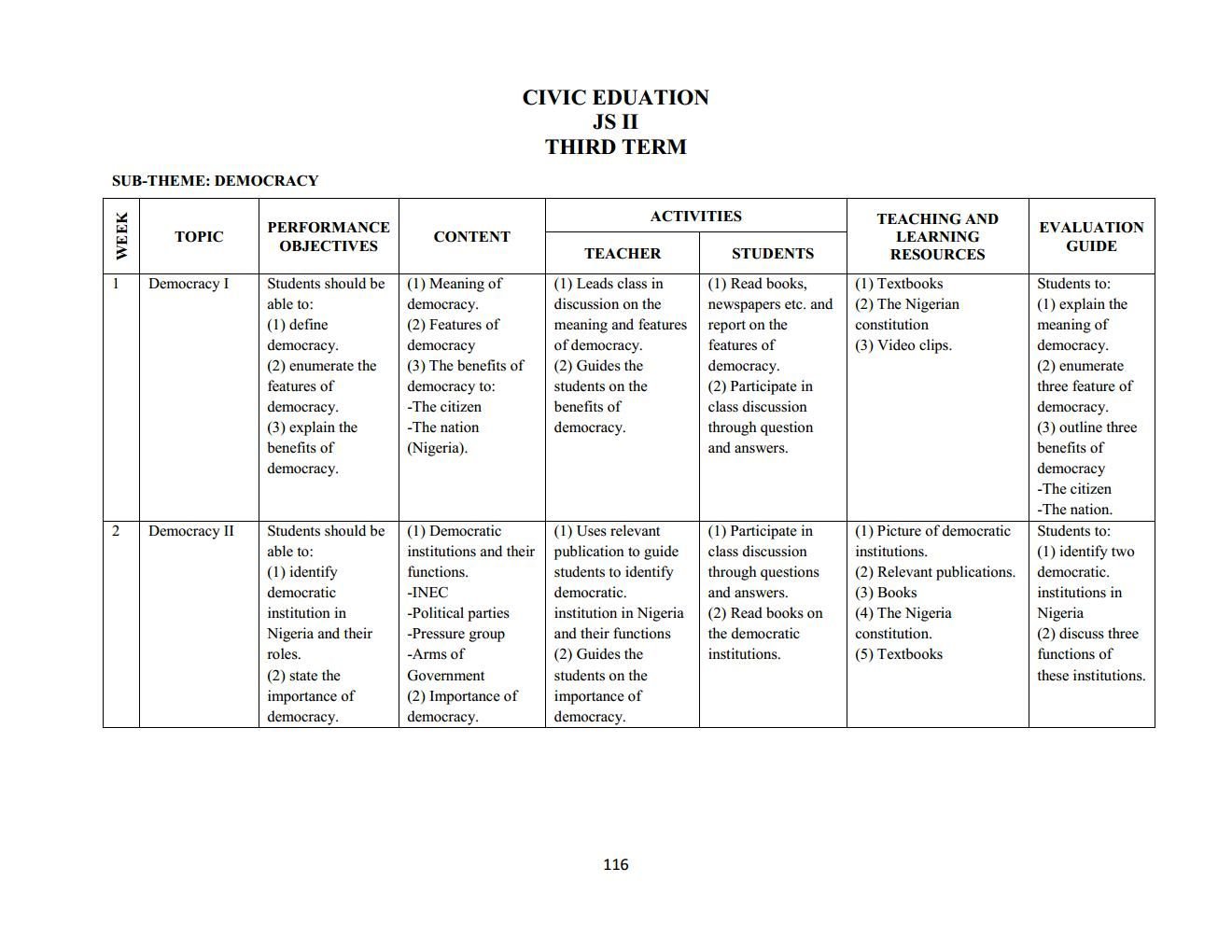Introducing the comprehensive – Home Economics Scheme of Work for JSS3 Third Term – meticulously crafted to equip students with the essential knowledge and skills they need to excel in domestic and personal life.
Key Takeaways:
- Topics: Focus on family living, pregnancy/childbirth, and child care.
- Revision: Includes review of food hygiene, food management, and packaging from previous term.
- Educational Goals: Cultivates knowledge, skills, and attitudes for managing resources and promoting well-being.
- Sources:
Home Economics Scheme of Work for JSS3 Third Term

As an experienced home economics educator, I’m excited to share my expertise in developing a comprehensive scheme of work for JSS3 Third Term. This guide will equip students with essential knowledge and skills in family living, pregnancy/childbirth, and child care.
Lesson Topics:
The third-term scheme of work covers the following topics:
- Family Living
- Family structure and roles
- Home management
- Pregnancy and Childbirth
- Pregnancy care and nutrition
- Labor and delivery
- Child Care
- Child development stages
- Feeding, bathing, and diapering
Scheme of Work Considerations:
- Revision: Begins with a review of the previous term’s topics on food hygiene, food management, and packaging.
- Age-Appropriateness: Lesson plans are tailored to the specific developmental needs of JSS3 students.
- Educational Goals: Aims to develop knowledge, skills, and attitudes in resource management for individual, family, and community well-being.
Instructional Strategies:
- Interactive discussions
- Hands-on activities
- Simulations and case studies
- Field trips and guest speakers
Assessment Methods:
- Quizzes and tests
- Projects and presentations
- Observations and assignments
By implementing this scheme of work, educators can effectively prepare students for their future responsibilities in family and domestic life.
-
If you are seeking admission into Kwame Nkrumah University of Science and Technology to study home economics, click on home economics courses offered in knust to view the list of courses you might encounter during your studies.
-
To become an expert in home economics, you must be equipped with adequate tools. Discover the extensive home economics equipment list we’ve assembled to help you excel in your studies or profession.
-
For those seeking guidance for their academic assignments, we present a comprehensive collection of home economics project topics that will ignite inspiration and provide ample options for your research endeavors.
-
To stay ahead in the academic arena, explore our meticulously curated home economics research topics that align with contemporary advancements and will undoubtedly enhance your understanding of the subject matter.
-
Educators seeking to enhance their teaching approach can benefit immensely from our meticulously crafted home economics scheme of work for jss1 second term.
Family Life

The Family Life aspect of home economics education in JSS3 Third Term focuses on equipping students with the knowledge and skills essential for navigating various aspects of family life.
- Family Structure and Roles: Understand the different types of family structures and the roles that members play within them.
- Pregnancy and Childbirth: Explore the journey of pregnancy and childbirth, including prenatal care, labor and delivery, and postpartum recovery.
- Child Care: Develop practical skills in caring for young children, including feeding, bathing, diapering, and promoting their developmental well-being.
- Family Resources and Needs: Investigate the resources available to families and how to utilize them effectively. This includes income management, budgeting, and resource allocation.
- Family Planning and Parenthood: Emphasize the importance of family planning and the responsibilities of parenthood.
Key Takeaways:
- Importance of Family Life: Family Life education provides a solid foundation for students to develop skills and knowledge crucial for establishing and maintaining healthy and fulfilling families.
- Age-Appropriate Curriculum: The scheme of work is designed to cater to the specific developmental needs and interests of students in JSS3.
- Interactive Learning: Hands-on activities, simulations, and guest speakers enhance the learning experience, making it engaging and relevant.
- Assessment for Understanding: A variety of assessment methods are employed to evaluate student understanding and application of concepts.
Relevant URLs:
- Home Economics JSS3 Third Term Scheme of Work
- Lesson Notes on Home Economics JSS3 Third Term
Home Management
Home management is an essential aspect of home economics that focuses on managing resources such as time, money, and space within a household setting. It’s crucial for maintaining a well-run and harmonious home.
Key Takeaways:
- Effective Home Management improves family well-being by creating a comfortable and functional living environment.
- Budgeting and Meal Planning help families allocate resources wisely and ensure nutritional needs are met.
- Smart Resource Allocation involves managing space and time efficiently to create a clutter-free and organized home.
- Efficient Home Maintenance contributes to a healthier and more sustainable living environment.
- Family Collaboration is key to successful home management, promoting shared responsibilities and a sense of teamwork.
Steps for Effective Home Management:
- Set Goals: Determine your priorities and goals for your household, considering the needs of all members.
- Time Management: Plan and allocate time for daily tasks, household chores, and family time. Consider using a planner or to-do list.
- Budgeting: Track income and expenses, set financial goals, and create a spending plan to avoid overspending and ensure financial stability.
- Space Management: Declutter, organize, and optimize available space to create a functional and comfortable home.
- Home Maintenance: Establish a regular cleaning schedule, carry out repairs promptly, and implement preventive measures to maintain a clean and healthy living environment.
- Resource Allocation: Allocate resources fairly among family members, ensuring everyone’s needs are met and resources are not wasted.
- Family Collaboration: Involve all family members in household tasks, fostering a sense of responsibility and shared ownership of the home.
Remember: Home management is an ongoing process that requires adaptation and adjustments as family needs and circumstances change. By incorporating these strategies, you can create a well-managed and thriving home environment for your family.
Citations:
– Home Economics Lesson Note for JSS3 Third Term
– Third Term Scheme of Work for Home Economics JSS 3
Entrepreneurship in Home Economics for JSS3 Third Term
Key Takeaways:
- Understand the importance of resource management and its role in entrepreneurship.
- Explore the nutritional needs of different family members and learn how to create nutritious meals on a budget.
- Develop skills in food preservation, storage, and preparation, which are essential for any entrepreneur in the food industry.
Content:
Entrepreneurship and Home Economics
Home economics is a subject that teaches essential life skills, including resource management and food preparation. These skills are not just useful for homemakers but also for any entrepreneur looking to start a business in the food industry.
Budgeting for Food
One of the most important aspects of entrepreneurship in home economics is learning how to budget for food. This means understanding the costs of different food items and being able to plan meals that are both nutritious and affordable.
Nutritional Needs
Another important aspect of home economics is learning about the nutritional needs of different family members. This is important for entrepreneurs in the food industry to understand so that they can develop products that meet the needs of their customers.
Food Preservation and Storage
Food preservation and storage are also important skills for entrepreneurs in the food industry. They need to know how to preserve food safely and efficiently so that it can be sold to customers.
Food Preparation
Learning food preparation methods is essential for any entrepreneur who wants to start a business in the food industry. They need to be able to prepare food that is both safe to eat and delicious.
Conclusion
Home economics is a subject that provides essential life skills for any entrepreneur looking to start a business in the food industry. By developing a strong foundation in budgeting, nutritional needs, food preservation, and storage, and food preparation, entrepreneurs can increase their chances of success.
Relevant URL Sources:
FAQ
Q1: What are the key topics covered in the Home Economics JSS3 Third Term Scheme of Work?
Q2: How does the Scheme of Work align with the educational goals of Home Economics for JSS3 students?
Q3: What resources are available to support teachers in delivering the Home Economics JSS3 Third Term scheme?
Q4: How is the scheme of work differentiated to meet the needs of diverse learners?
Q5: How does the scheme of work promote the development of life skills and practical knowledge in students?
- Grass Forever in Livermore: Your Guide to Artificial Turf - April 22, 2025
- German Roaches vs. American Roaches: Key Differences and Control - April 22, 2025
- 150+ Flowers That Start With S: A Comprehensive Guide - April 22, 2025










